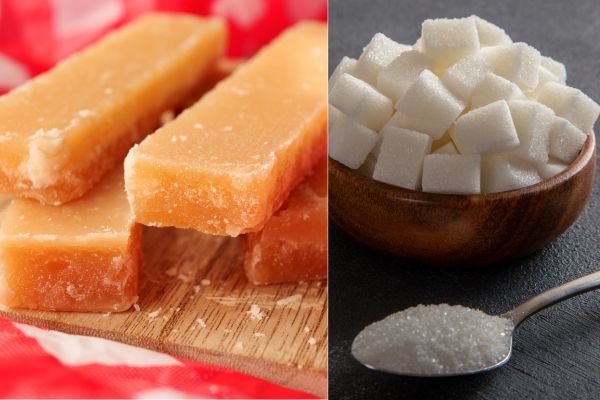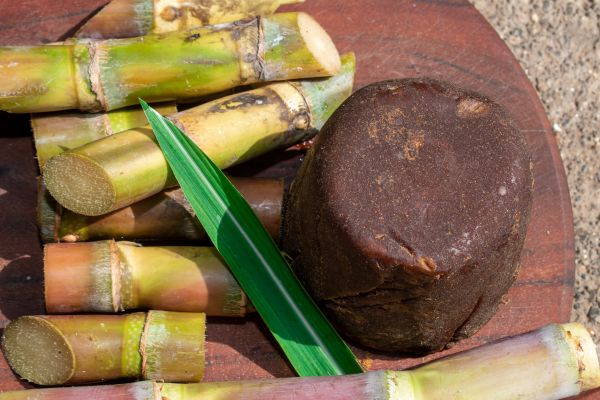When it comes to sweeteners, jaggery and sugar may look similar, but they are worlds apart in terms of health benefits. Jaggery, made from unrefined sugarcane or palm sap, retains more natural minerals like iron, calcium, and magnesium, while regular white sugar is highly processed and stripped of nutrients. Jaggery is known for aiding digestion and boosting immunity, whereas sugar offers quick energy but can spike blood sugar levels and contribute to health problems like diabetes and obesity. For a healthier alternative, jaggery wins, providing sweetness with added nutrients, making it the better choice for your health.
What is Jaggery?
Jaggery is a traditional, unrefined sweetener made from sugarcane or palm sap. It’s popular in many parts of the world, especially in South Asia and Africa, but it’s gaining attention in the USA for its potential health benefits. Unlike refined white sugar, which goes through heavy processing to remove molasses and nutrients, jaggery retains most of its natural minerals like iron, potassium, and calcium. This gives it a rich, caramel-like flavor and a darker color. Jaggery is considered a more wholesome alternative to sugar because it’s less processed and offers small amounts of nutrients. While it’s still a form of sugar and should be consumed in moderation, jaggery’s natural qualities and minimal processing make it an appealing choice for those looking for healthier sweetening options.
Jaggery Vs Sugar: Which is Better for your Health?

When comparing jaggery and refined sugar, the key difference lies in their nutritional content. Refined sugar is highly processed, stripped of any natural nutrients, and provides only empty calories, leading to quick spikes in blood sugar. Jaggery, on the other hand, is far less processed and retains many of the vitamins and minerals from the sugarcane or palm sap it’s made from. It contains small amounts of iron, magnesium, potassium, and calcium, making it a more nutritious option than sugar.
Jaggery also has antioxidants, which can help fight oxidative stress in the body. While jaggery still contains calories and natural sugars, its added nutritional value makes it a better choice for those looking to reduce processed foods in their diet. However, both jaggery and refined sugar should be consumed in moderation, as they can contribute to weight gain and other health issues if overused. If you’re looking for a sweetener that offers more than just sweetness, jaggery can be a healthier alternative to refined sugar.
Health Benefits of Jaggery?
1. Aids Digestion
Jaggery is a natural digestive aid. It helps stimulate the release of digestive enzymes, which can improve digestion and prevent issues like constipation and bloating. Consuming a small piece of jaggery after meals is a traditional remedy that many people swear by for better digestion.
2. Boosts Immunity
Packed with essential nutrients like iron, magnesium, and zinc, jaggery can give your immune system a boost. Regular consumption helps the body fight off infections and stay healthier, especially during colder months. Its ability to improve the body’s resistance to illness makes it a great addition to your diet.
3. Detoxifies the Body
Jaggery is known for its detoxifying properties. It helps cleanse the liver by flushing out toxins from the body. The minerals in jaggery also promote healthy blood circulation and aid in the removal of harmful substances, leaving you feeling refreshed.
4. Rich in Antioxidants
As a good source of antioxidants, jaggery helps neutralize harmful free radicals in the body. This can protect your cells from oxidative stress and support overall health. Including jaggery in your diet may help reduce the risk of certain chronic diseases and support healthy aging.
Jaggery in your Diet: How to use it?

1. Sweeten Your Teas
Replace refined sugar with jaggery in your favorite teas, such as ginger or green tea. Just add a small piece or a spoonful to your cup for a rich, warm sweetness that also offers health benefits.
2. Wholesome Desserts
Jaggery works beautifully in desserts. Use it in traditional recipes like rice pudding or as a sweetener in cakes and cookies. You can also mix it with yogurt and fruits for a nutritious and tasty treat.
3. Energy Snacks
Create energy balls by mixing jaggery with nuts, seeds, and dried fruits. This combination makes a perfect snack to keep you energized throughout the day.
4. Flavorful Curries
A pinch of jaggery can balance the flavors in savory dishes. Add it to curries and stir-fries for a touch of sweetness that enhances the overall taste.
These simple ideas can help you enjoy the unique flavor and health benefits of jaggery while making your meals more enjoyable. Are you interested to read more interesting Health related Articles or Blog Posts, you must visit this website.
Is Jaggery Good for Weight Loss?

Jaggery can be a helpful addition to a weight loss plan when used in moderation. Unlike refined sugar, jaggery is a natural sweetener packed with nutrients. Its rich flavor and natural sweetness can satisfy your sweet cravings without the empty calories that come from processed sugars. When you use jaggery in place of refined sugar, you may find that you need less sweetness overall, helping you to cut back on calories.
Moreover, jaggery contains fiber, which can promote feelings of fullness and reduce hunger pangs. This can be beneficial when you’re trying to manage your weight. By including jaggery in your diet, you might also find yourself less likely to reach for unhealthy snacks, as it can curb sugar cravings more effectively.
Jaggery provides essential minerals like iron and magnesium, which can support your overall health during your weight loss journey. However, it’s important to remember that moderation is key. While jaggery has health benefits, consuming it in excessive amounts can lead to weight gain. Incorporate it wisely into your diet, and you can enjoy its sweet taste while still working towards your weight loss goals.
Jaggery for Skin and Hair Health
Jaggery is not just a tasty sweetener; it can also work wonders for your skin and hair health. Rich in essential minerals like iron, magnesium, and zinc, jaggery provides the nutrients your body needs to maintain healthy skin. These minerals help improve blood circulation, which can lead to a natural glow and healthier-looking skin.
One of the key benefits of jaggery is its ability to prevent acne. Its anti-inflammatory properties can help reduce redness and irritation associated with breakouts. Additionally, jaggery acts as a natural detoxifier, flushing out toxins from your body, which can lead to clearer skin. By including jaggery in your diet, you may find that your skin becomes less prone to acne and blemishes.
Moreover, the antioxidants found in jaggery help combat free radicals, which can cause premature aging and dullness. When your skin receives the right nutrients, it looks more vibrant and youthful.
For hair health, the vitamins and minerals in jaggery can strengthen hair follicles and promote growth, making it a great addition to your beauty routine. By using jaggery regularly, you can enjoy not only its sweet taste but also its impressive skin and hair benefits.
Are There Any Side Effects of Jaggery?
While jaggery offers many health benefits, it’s important to consume it in moderation to avoid potential side effects. One of the main risks of overconsumption is weight gain. Although jaggery is a natural sweetener, it is still high in calories. Eating too much can lead to an excess calorie intake, which may result in unwanted weight gain if not balanced with physical activity.
Another concern is that jaggery can impact blood sugar levels. Despite being a healthier alternative to refined sugar, it still contains sugars that can spike glucose levels if consumed excessively. This is particularly important for individuals with diabetes or those trying to manage their blood sugar.
To enjoy the benefits of jaggery while minimizing risks, it’s best to use it in moderation. Incorporate small amounts into your meals and snacks, and consider pairing it with foods high in fiber, such as fruits or whole grains, to help slow down sugar absorption. Aim for a balanced diet that includes a variety of nutrients, and remember that moderation is key to making jaggery a healthy part of your lifestyle without the drawbacks.
Why you should consider Adding Jaggery to your Diet?
Jaggery is a fantastic natural sweetener that offers numerous health benefits worth considering for your diet. Unlike refined sugar, jaggery is packed with essential minerals and vitamins, making it a healthier choice. It aids digestion, boosts immunity, and helps detoxify the body, all while providing a rich, caramel-like flavor to your meals. Additionally, jaggery can satisfy your sweet cravings without the empty calories of processed sugars, promoting a feeling of fullness and potentially aiding in weight management. Its antioxidant properties help improve skin health and can even reduce acne. By incorporating jaggery into your daily routine, whether in teas, desserts, or energy snacks, you can enjoy its delicious taste and health benefits. So, why not give jaggery a try? You’ll be pleasantly surprised at how this simple ingredient can enhance your well-being while satisfying your sweet tooth.
FAQs
Q.1 How is jaggery made?
Jaggery is made by extracting the sap from sugarcane or date palms, boiling it down to remove moisture, and then cooling it to form solid blocks or granules. This traditional method preserves the natural nutrients and flavors.
2. Can I use jaggery as a sugar substitute in baking?
Yes, you can use jaggery as a sugar substitute in baking! However, keep in mind that it has a distinct flavor and may alter the texture of your baked goods. You may need to adjust the liquid content in your recipes since jaggery is often more moist than refined sugar.
3. How should I store jaggery?
Store jaggery in a cool, dry place in an airtight container to keep it fresh. Avoid exposure to moisture, as this can cause it to clump or spoil. Proper storage will help maintain its flavor and texture.
4. Is jaggery suitable for vegans?
Yes, jaggery is vegan-friendly since it is derived from plant sources and does not contain any animal products. It’s a great sweetener option for those following a vegan lifestyle.
5. What are some health benefits of jaggery?
Jaggery aids digestion, boosts immunity, detoxifies the body, and is rich in antioxidants. It can also help improve skin health and prevent acne, making it a beneficial addition to your diet.
6. Can jaggery help with menstrual pain?
Some traditional remedies suggest that jaggery can help alleviate menstrual cramps due to its iron content and ability to boost energy levels. However, individual results may vary, and it’s best to consult a healthcare professional for persistent issues.
7. Is there a difference between jaggery and brown sugar?
Yes, there is a difference! Brown sugar is processed sugar mixed with molasses, while jaggery is unrefined and retains its natural minerals and nutrients. Jaggery has a more complex flavor profile and offers more health benefits compared to brown sugar.
8. Can children eat jaggery?
Yes, jaggery can be a healthy sweetener option for children when consumed in moderation. It provides essential nutrients that can benefit their growth. However, be cautious about sugar intake overall, and introduce it gradually.

